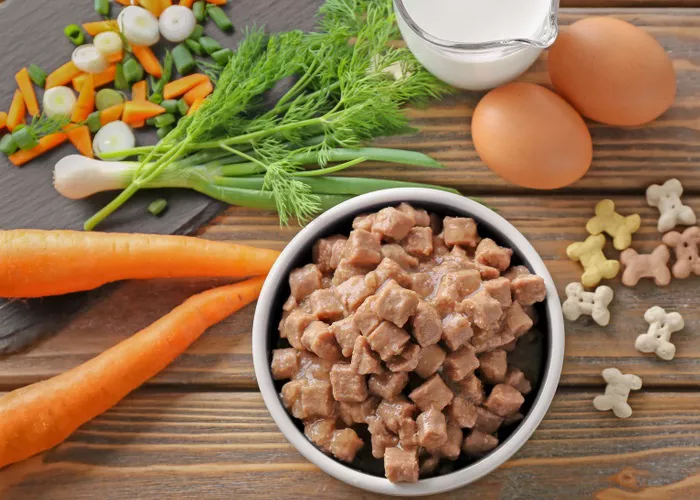Many dog owners struggle when deciding what to give their furry friends for dinner. With so many options on the market, choosing the right foods that provide all the nutrients needed for a healthy diet can be overwhelming. In this article, I will discuss what a healthy dog dinner is, including the types of food dogs should eat, the nutrients they need, and how to choose the right food for your dog.
Types of Food Dogs Should Eat
When it comes to choosing the right types of food for dogs, it’s important to remember that dogs are primarily carnivorous animals. This means that their diet should be based on animal protein, which provides the essential amino acids that dogs need for healthy muscle growth and maintenance. Meat is the best source of animal protein for dogs, and it can be cooked or raw depending on your preference.
In addition to meat, dogs can also benefit from eating vegetables and fruits. Vegetables like carrots, peas, and spinach are rich in vitamins and minerals that are important for a dog’s overall health. Fruits like apples and bananas are also a good source of vitamins and fiber. However, it’s important to keep in mind that not all vegetables and fruits are safe for dogs to eat. Some vegetables like onions and garlic can be toxic to dogs, while some fruits like grapes and raisins can cause kidney failure.
The Nutrients Dogs Need
Dogs require a balanced diet that provides all the necessary nutrients for their body to function properly. Protein is the most important nutrient for dogs as it provides the building blocks for healthy muscles, organs, and tissues. Dogs need at least 18% protein in their diet, but active dogs may require more. Good sources of protein for dogs include chicken, beef, lamb, and fish.
Fat is also an important nutrient for dogs as it provides energy and helps absorb vitamins. However, too much fat can lead to obesity and other health problems. Dogs need at least 5% fat in their diet, but no more than 15%. Good sources of fat for dogs include fish oil, chicken fat, and flaxseed.
Carbohydrates are a good source of energy for dogs, but they should not make up more than 50% of their diet. Dogs can get carbohydrates from vegetables, fruits, and grains. However, it’s important to choose high-quality sources of carbohydrates that are easy to digest and provide essential nutrients.
Vitamins and minerals are essential for a dog’s overall health. Dogs need vitamins A, D, E, and K, as well as B vitamins like thiamine and niacin. They also need minerals like calcium, phosphorus, and potassium. These nutrients can be found in a variety of foods, including meat, vegetables, and fruits.
Water is the most important nutrient for dogs as it helps regulate body temperature, aids in digestion, and keeps the body hydrated. Dogs should have access to clean drinking water at all times, and they should be encouraged to drink water throughout the day.
How to Choose the Right Food for Your Dog
Choosing the right food for your dog can be a daunting task, but there are a few things you can look for to ensure you are providing a healthy diet for your furry friend. First, look for a dog food that is labeled “complete and balanced.” This means that the food contains all the necessary nutrients for a healthy diet, including protein, fat, carbohydrates, vitamins, minerals, and water.
Next, check the ingredients list. The first ingredient should be a source of animal protein, such as chicken or beef. Avoid dog foods that list “meat by-products” or “animal digest” as the first ingredient, as these are low-quality sources of protein. It’s also important to avoid dog foods that contain artificial preservatives, colors, and flavors. These additives can be harmful to your dog’s health and can cause allergic reactions or digestive problems.
Finally, consider your dog’s age, activity level, and health needs when choosing a dog food. Puppies and senior dogs have different nutritional needs than adult dogs, and active dogs may require more protein and fat in their diet. It’s important to consult with your veterinarian to determine the best diet for your dog based on their individual needs and health status.
Conclusion
In conclusion, providing a healthy diet for your dog is essential for their overall health and well-being. Dogs should eat a diet that is primarily based on animal protein, with vegetables and fruits as a supplement. They need a balanced diet that provides all the necessary nutrients, including protein, fat, carbohydrates, vitamins, minerals, and water. When choosing a dog food, look for one that is labeled “complete and balanced,” contains high-quality sources of protein, and does not contain artificial additives. By providing a healthy diet for your furry friend, you can help ensure a long and happy life for your beloved pet.
Related Topics:


